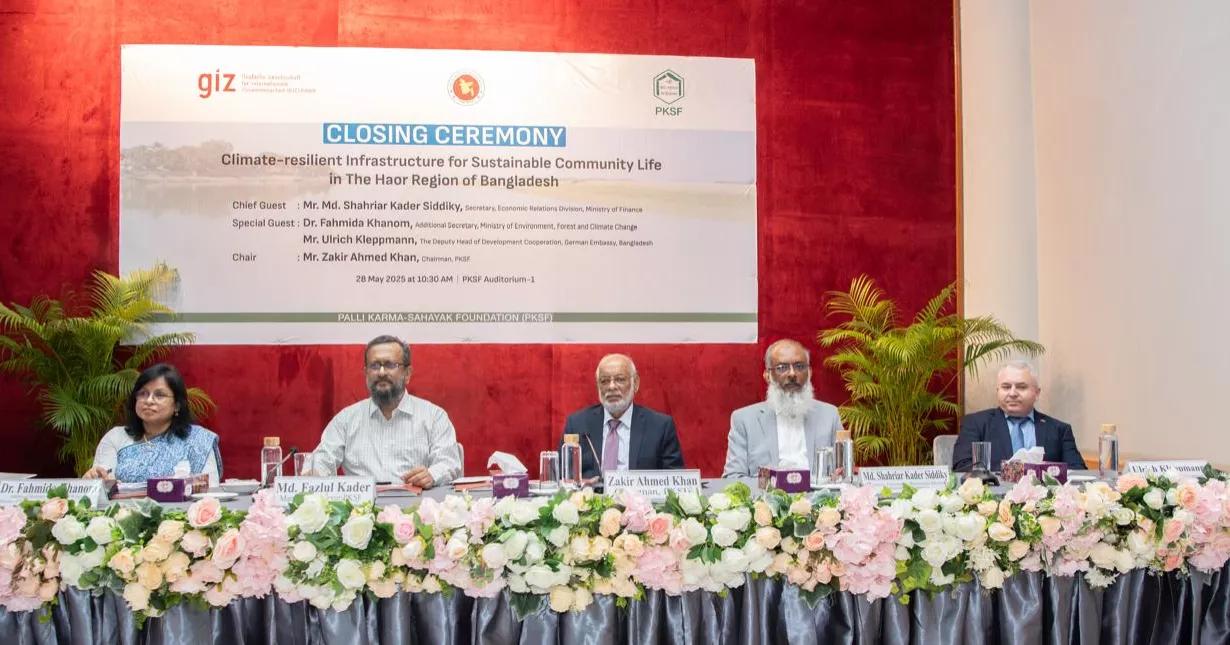Staff Correspondent
Published:2025-05-28 22:28:53 BdST
‘Climate disasters erode up to 2pc of Bangladesh’s GDP’
Bangladesh incurs an annual GDP loss of 1–2% due to climate change-induced disasters such as floods, droughts, cyclones, tidal surges and heatwaves.
Despite limited resources, the government has been implementing numerous initiatives to address these challenges.
However, long-term, sustainable measures and continued support from development partners remain critical.
These observations were shared at the closing ceremony of the project “Climate-Resilient Infrastructure for Sustainable Community Life in the Haor Region of Bangladesh”, known as giz-Haor, held at PKSF Bhaban in the city.
The project was implemented by Palli Karma-Sahayak Foundation (PKSF) with funding from the German government.
The event was chaired by PKSF Chairman Zakir Ahmed Khan, with Md Shahriar Kader Siddiky, secretary of the Economic Relations Division, attending as the chief guest.
Fahmida Khanom, additional secretary (Environment Wing) of the Ministry of Environment, Forest and Climate Change, and Ulrich Kleppmann, deputy head of Development Cooperation at the German Embassy in Bangladesh, were present as special guests.
PKSF Managing Director Md Fazlul Kader delivered the welcome address. Presentations were given by PKSF Deputy Managing Director Fazle Rabbi Sadeque Ahmed and General Manager AKM Nuruzzaman.
Secretary Shahriar highlighted that the government has implemented over 800 projects through the Bangladesh Climate Change Trust Fund and allocates 6–7% of the national budget annually to address climate change impacts.
He noted that Bangladesh’s two Direct Access Entities to the Green Climate Fund—PKSF and IDCOL—have secured USD 447.3 million for nine projects and eight capacity-building initiatives.
He expressed hope that PKSF would scale up its interventions to expand the positive outcomes of the giz-Haor project.
The PKSF chairman emphasised the organisation’s commitment to transparency, integrity, and rigorous monitoring, which ensures the effectiveness and quality of its interventions.
He affirmed PKSF’s continued efforts to promote sustainable and inclusive development by strengthening the adaptive capacities of climate-vulnerable communities.
Kleppmann shared that the German government is currently supporting 53 development projects in Bangladesh and reiterated Germany’s long-term commitment to climate and development cooperation.
Fahmida stated that addressing climate change cannot be the responsibility of the government alone. “This can only be achieved through collective action involving the government, private sector, and NGOs,” she stressed.
The PKSF managing director highlighted that PKSF, as a Direct Access Entity to both the Green Climate Fund and the Adaptation Fund, is undertaking various initiatives to combat floods, droughts, and salinity.
“Our efforts are improving the resilience of vulnerable communities by promoting sustainable agriculture, water resource management, and disaster risk reduction,” he added.
Under the giz-Haor project, climate-resilient infrastructure such as CC block revetments and retaining walls were constructed in three unions of Sunamganj district to protect homes from flash flood-induced erosion.
As a result, approximately 7,500 families are now safeguarded. Additionally, elevated community spaces have enhanced food storage capabilities, boosting the economic resilience of poor households.
Tree plantations along the protective structures have also contributed to biodiversity conservation. In total, 1.54 kilometers of protective walls were built in Jamalganj and Derai upazilas.
Unauthorized use or reproduction of The Finance Today content for commercial purposes is strictly prohibited.


